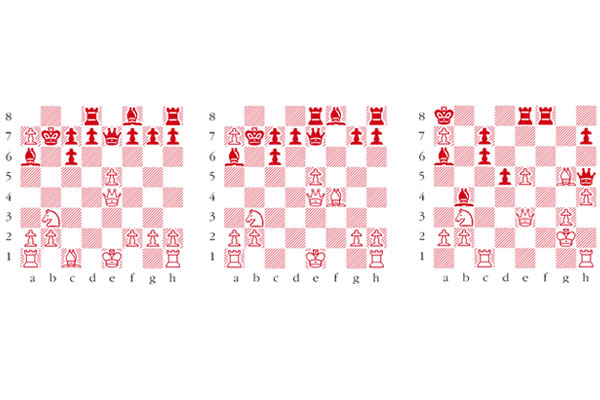In my series of homages to great masters in London, this week an outstanding win by Anatoly Karpov, who took first prize in the major international tournaments in London 1982 and London 1984. The position is by Alexander Alekhine who came second to Capablanca in London 1922, won in London 1932 and would have defended his world title in London against Botvinnik in 1946, had he lived.
Timman-Karpov: London 1984; Scotch Game
1 e4 e5 2 Nf3 Nc6 3 d4 exd4 4 Nxd4 Nf6 5 Nxc6 bxc6 6 e5 Qe7 7 Qe2 Nd5 8 c4 Ba6 9 Qe4 Timman tries something unusual but it is hardly to be recommended since after 9 … Nf6 White has nothing better than repeating with 10 Qe2. However, Karpov quickly perceives that there is something even more promising in the position. 9 … Nb6 10 Nd2 0-0-0 11 c5 This is Timman’s new idea for the game. 11 … Bxf1 12 cxb6 Ba6 13 bxa7 Kb7 14 Nb3
Karpov has responded well. His bishop pair and mobile central pawns weigh more heavily than the disruption to his king. With 14 Nb3, Timman intends to swing units across to harry the black king but more prudent would have been 14 Nf3, lending protection to the e5-pawn. 14 … f6 15 f4 This is very weakening but 15 Bd2 Qxe5 16 Qxe5 fxe5 17 0-0-0 d5 looks very pleasant for Black. 15 … fxe5 16 fxe5 Re8 17 Bf4 (see diagram 2)
17 … Qh4+ Also very good is 17 … Qb4+ 18 Qxb4 Bxb4+ 19 Kd1 Rhf8, but this queen check is even more annoying. 18 g3 Qh5 There are now horrible threats against e2 and White cannot castle out of danger. Seirawan suggested 19 a8Q+ Kxa8 to prevent the black king from sheltering on a8 but further analysis indicated this wouldn’t help White. 19 Rc1 Ka8 20 h4 Preventing … g5. 20 … d5 Black is remorseless. 20 … Bd6 21 Rc5 Bxc5 22 Nxc5 would have allowed White to thrash around somewhat. 21 Qe3 If 21 Qc2 Rxe5+! 22 Bxe5 Qxe5+ 23 Kf2 Bd6 24 Kg1 Rf8 wins. 21 … g5 22 Bxg5 Bb4+ 23 Kf2 If 23 Rc3 Rxe5 24 Qxe5 Re8 wins. 23 … Rhf8+ 24 Kg2
24 … Rxe5 Simple demolition. White could resign here. 25 Qxe5 Qf3+ 26 Kh2 Qf2+ White resigns 27 Kh3 Bc8+ 28 g4 Rf3+.





Comments